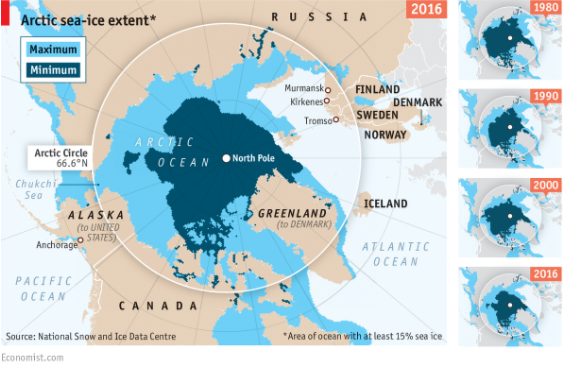The Arctic is now expected to be ice-free by 2040

The Arctic Council foresees increased shipping once the sea-ice has disappeared.
Image: REUTERS/NASA
Stay up to date:
Arctic
The last piece of summer sea-ice in the Arctic is expected to melt away in just 23 years, three decades earlier than previously expected.
Scientists now believe that the summer of 2040 will see the end of the frozen north pole after a rapid shrinking of the ice coverage in recent years, according to a report from the Arctic Council.
The scientific policy group of the eight countries with territory in the Arctic Circle says that over the past 30 years, the minimum coverage of summer ice has fallen by half while its volume has fallen by three-quarters. This change has profound implications, beyond those countries that have a direct stake in the region.

On the upside, the Arctic Council foresees increased shipping once the sea-ice has disappeared. Using the route across the top of the world to sail from northern Europe to north-east Asia can cut the length of voyages by two-fifths compared with travelling via the Suez Canal.

But even in the summer, the Arctic ocean can be stormy and unpredictable and may become more so as the planet warms. It is certainly not the easy option, despite the shorter journey.
So while there may be a limited benefit to the end of summer ice, it is far outweighed by the risks.
The world’s winds are driven partly by the temperature difference between the north and south poles and the tropics. With the Arctic heating faster than the tropics, this difference will decrease and wind speeds will slow, possibly disrupting the northern jet stream and leading to more extreme weather.
Ocean currents could slow down too. At the moment, the cooling of surface water moving north causes it to sink for the return journey south, helping to drive the gulf stream. If this process is disrupted, it could impact everything from the Indian monsoon to the pattern of El Niño in the Pacific ocean.
Even if all the countries that signed up to the Paris Climate Agreement stick to their pledges (which is seen as unlikely) the amount of carbon dioxide expected to be in the atmosphere over the coming decades is likely to be enough to wipe out the Arctic summer ice for good.
Accept our marketing cookies to access this content.
These cookies are currently disabled in your browser.
Don't miss any update on this topic
Create a free account and access your personalized content collection with our latest publications and analyses.
License and Republishing
World Economic Forum articles may be republished in accordance with the Creative Commons Attribution-NonCommercial-NoDerivatives 4.0 International Public License, and in accordance with our Terms of Use.
The views expressed in this article are those of the author alone and not the World Economic Forum.
Related topics:
Forum Stories newsletter
Bringing you weekly curated insights and analysis on the global issues that matter.
More on Climate ActionSee all
Lee Poh Seng and Heng Wang
May 12, 2025
Jean-Claude Burgelman and Lily Linke
May 9, 2025
Tejashree Joshi
May 8, 2025



